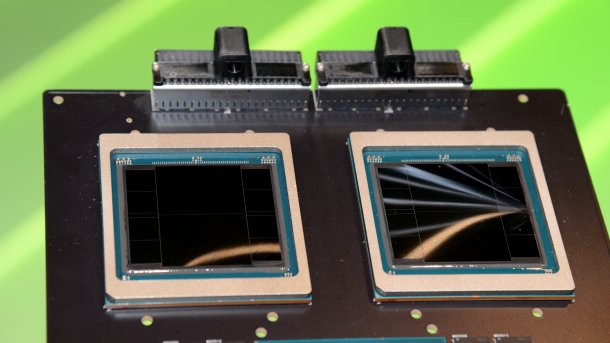USA wants to heavily regulate the global AI market
New US regulations also affect German companies. GPUs are to be subject to strict restrictions in future.

A server GPU that would certainly be affected by the new restrictions: Nvidia's Blackwell GB200.
(Image: c't / csp)
The current US administration under Joe Biden wants to further restrict the spread of US technology abroad with regard to AI algorithms. To this end, it has proposed a comprehensive "Export Control Framework for Artificial Intelligence Diffusion", which is now subject to a 120-day comment period and could then be passed under Trump from April. According to its own argumentation, this is intended to strengthen the security interests of the USA, particularly in relation to China.
18 privileged countries
Instead of maintaining a so-called entity list of countries to which special export rules apply, the USA wants to turn the tables: Chip designers such as AMD, Nvidia and Intel would then only be allowed to sell their GPU accelerators for AI training in 18 countries without restriction. This concerns "advanced GPUs", although their definition is still unclear.
At least the defined exceptions make it clear that private users and individual gaming graphics cards are not affected.
The 18 countries are Australia, Belgium, Canada, Denmark, Finland, France, Germany, Ireland, Italy, Japan, the Netherlands, New Zealand, Norway, South Korea, Spain, Sweden, Taiwan and the United Kingdom. All other countries are divided into Tier 2 and "questionable" regions.
However, it is not only the headquarters of a company that wants to buy accelerators that is relevant, but also where the chips are used. For example, if a German company wants to build a data center in Iceland, it would have to pass a security check by the US Bureau of Industry and Security (BIS). This would give it "Universal Verified End User" (UVEU) status. A maximum of 7 percent of a company's global computing capacity may then be located abroad.
Companies in Tier 2 countries are granted "National Verified End User" (NVEU) status with the same security provisions and may purchase up to 320,000 GPUs over the next two years. The limits apply across all manufacturers, so there would have to be coordination between AMD, Nvidia & Co.
Major cut for the others
Companies that do not operate in any of the 18 partner countries and do not receive NVEU status may purchase 50,000 GPUs per country. If a company operates data centers in two countries, for example, the limit would have to be 100,000 GPUs. Apparently, this also applies for a 2-year period.
The 50,000 limit can be doubled with intergovernmental agreements. The draft of the agreements deals with agreements in the fields of "export control, clean energy and technology security".
Orders for a maximum of 1700 GPUs are excluded from the limits. These days, such quantities are only sufficient for smaller data centers. It is questionable how the USA intends to take action against many fragmented orders – possibly via front companies –.
Monitoring of AI models
In addition to the export restrictions for hardware, the USA wants to restrict the distribution of large AI models and their underlying training weights. A draft provides for approval procedures if a company wishes to "export, re-export or transfer" models above a specified required computing power. This could be an AI model that has been trained in a partner country and is then to be licensed abroad for an AI assistant.
Videos by heise
The only omnipresent requirement is that the algorithm must have been developed using US technology. If you are petty, you can argue this for any AI model, for example by using popular US EDA tools in chip development.
The initial proposed limit is 100 quadrillion (10^26) operations over the entire training period. Modern supercomputers with an AI computing power of 200 exaflops (e.g. in the INT8 data format) need just under two months of computing time for such a value. The limitation therefore affects the largest AI models.
This applies to closed models ("closed-weight") and not to open-source models. The limit does not apply to closed models if there is an open-source alternative.
Empfohlener redaktioneller Inhalt
Mit Ihrer Zustimmung wird hier ein externer Preisvergleich (heise Preisvergleich) geladen.
Ich bin damit einverstanden, dass mir externe Inhalte angezeigt werden. Damit können personenbezogene Daten an Drittplattformen (heise Preisvergleich) übermittelt werden. Mehr dazu in unserer Datenschutzerklärung.
(mma)